The Tsinghua Management Global Forum, an event attached to the Tsinghua University School of Economics and Management (Tsinghua SEM) 2023 Advisory Board Meeting, took place on October 18 at Tsinghua SEM. Distinguished speakers, including A. Michael Spence, Philip H. Knight, professor emeritus of management at Stanford University, 2001 Nobel Laureate in Economics, and a member of the Tsinghua SEM Advisory Board, and BAI Chong-En, Mansfield Freeman chair professor and the dean of Tsinghua SEM, met to discuss the theme "Permacrisis: A Plan to Fix a Fractured World."
The Forum was attended by LOU Jiwei, a specially invited expert from the Advisory Board of Tsinghua SEM, Standing Committee member and chairman of the Committee of Foreign Affairs, the 13th National Committee of the Chinese People's Political Consultative Conference (CPPCC), and former Minister of Finance; Professor QIAN Yingyi, vice-chair of the Advisory Board of Tsinghua SEM, distinguished professor of arts, humanities and social sciences at Tsinghua University, fourth dean of Tsinghua SEM; John L. Thornton, executive chairman of Barrick Gold Corporation, chairman of Pinebridge Investments, and chair emeritus of Brookings Institution. More than 400 students and faculty members participated in the high-level conversation. The discussions were moderated by HE Ping, professor and chair of the Department of Finance and deputy dean of Tsinghua SEM.
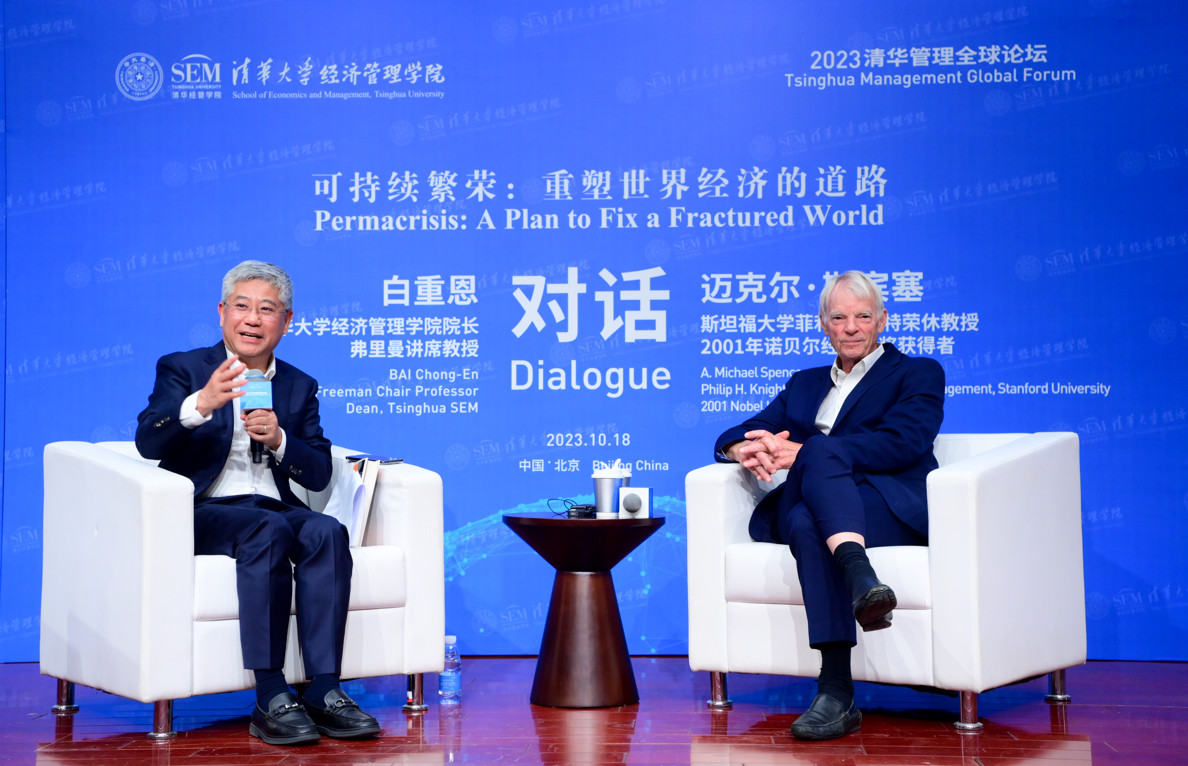
BAI Chong-En speaks with A. Michael Spence.
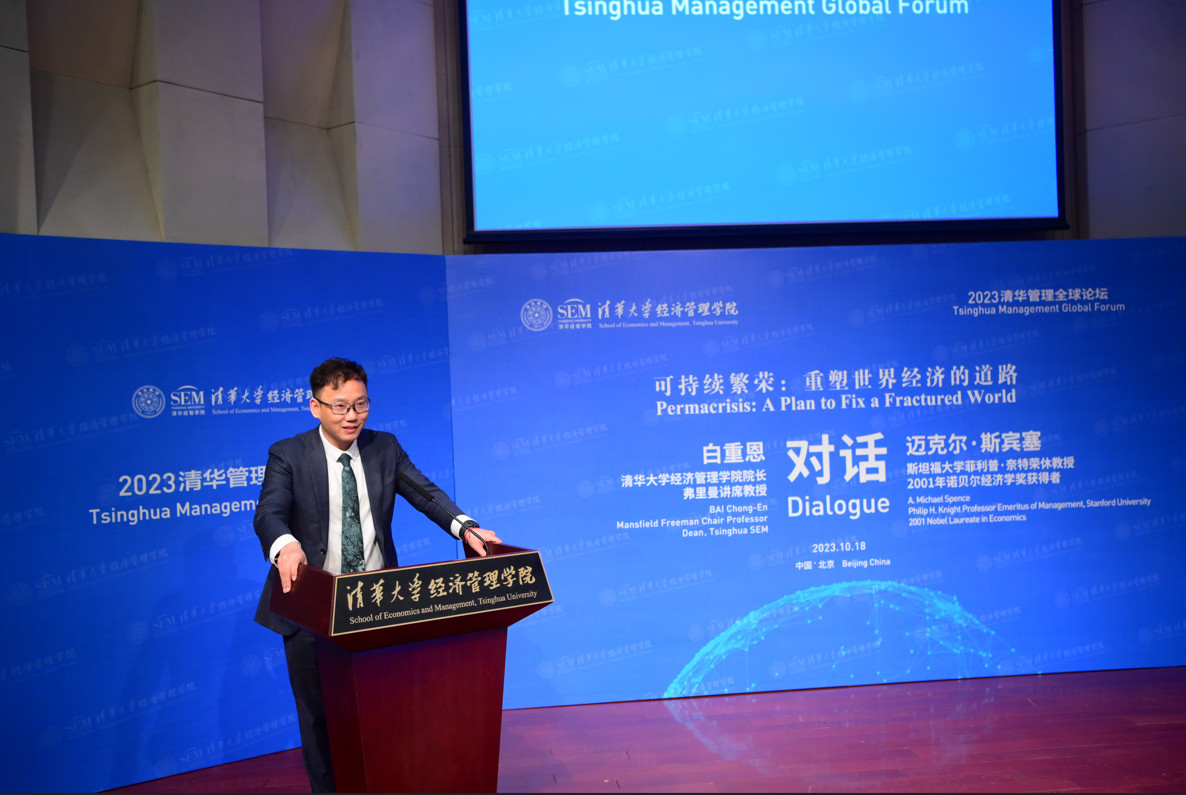
HE Ping moderates the forum.
BAI initiated the proceedings with his opening remarks, delving into the historical journey of Tsinghua SEM and emphasizing the forum's profound importance. "The forum's aim is to generate innovative ideas and solutions to global economic challenges. Furthermore, through the Tsinghua Management Global Forum, we hope to enhance communication and collaboration with all our esteemed guests and jointly promote the development and prosperity of the global economy," BAI said. He also introduced Spence, a Nobel Laureate in Economics renowned for his pioneering work in information economics. Spence, in collaboration with three scholars from diverse backgrounds, recently wrote Permacrisis: A Plan to Fix a Fractured World, a book exploring solutions to global economic issues.
Spence delivered a keynote speech titled "The Global Economy in the Next Generation." He called attention to "regime change in the global economy" and discussed the shift from demand-driven to supply-constrained growth. This transformation bore significant consequences, such as the "first inflation in 20 years," "delayed responses by Central Banks," "rapidly diminishing fiscal capacity," "climate emergencies," "increased indebtedness," and "growing inequalities and pervasive insecurity." He stressed the pivotal role of technology and scientific advancement in achieving economic sustainability. "A huge amount of new technology is associated with massive energy transition. This makes technological tools and clean energy more accessible. Take solar costs for example: China has played a major role in this and in driving solar costs down," Spence said.
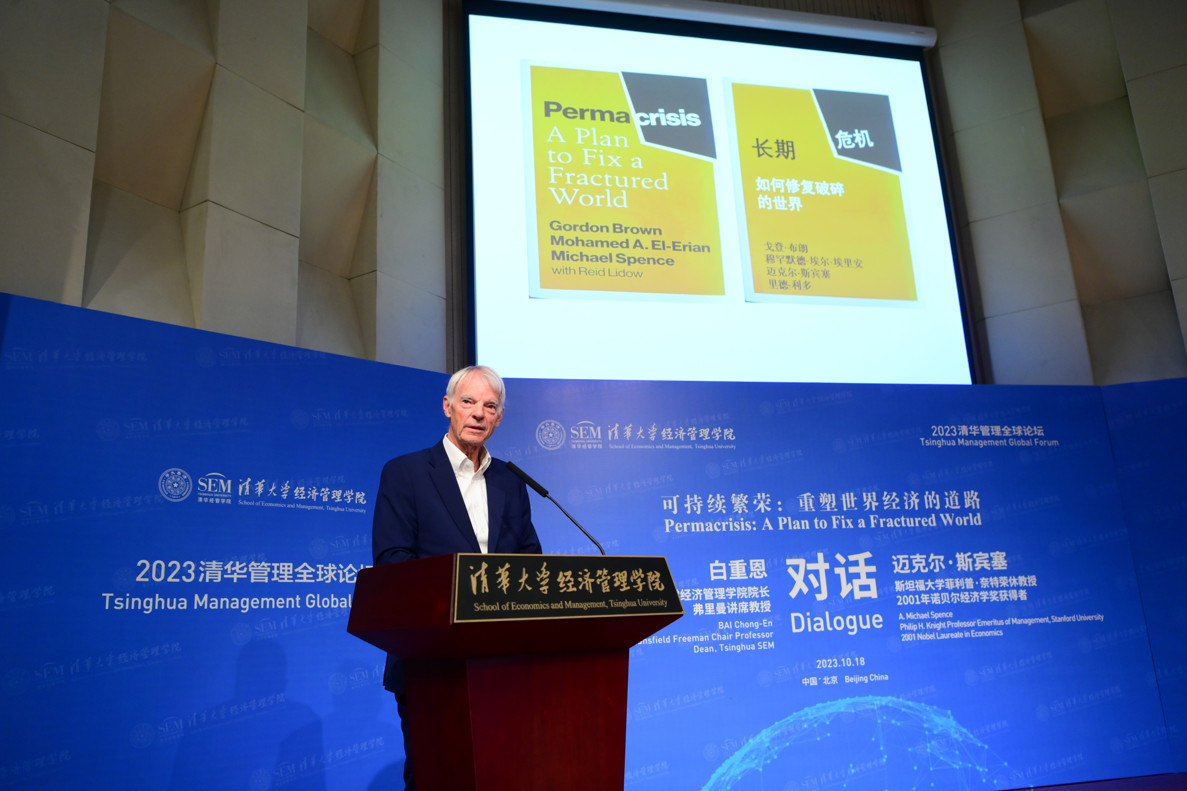
Professor A. Michael Spence delivers his keynote speech.
During the dialogue section, BAI posed questions about AI technology, new growth models, the digital divide, and globalization, all of which were central themes in the new book. He touched upon the rapid advancements in AI technology exemplified by the exponential growth of ChatGPT users, which reached 20 million in just two months. In response, Spence outlined his vision of the future of AI, saying it should act as a digital assistant to augment human capabilities rather than replace them. A significant portion of the new book focused on the concept of "the new growth model," which advocated actions that tie economics, finance, institutions, politics, and societal well-being together.
The dialogue also encompassed a discussion between BAI and Spence on the parallels between the new growth model presented in the book and the "Chinese version of high-quality growth." Elements such as "inclusiveness," "living harmoniously with nature," and "balancing security with development" were recognized as crucial concepts in China's development strategy, although these are often misconstrued by Western societies. Both scholars expressed the hope that China could improve its international communication to rectify these misconceptions and facilitate better collaboration with foreign partners.
The "digital divide" emerged as another significant topic in this dialogue, with a focus on the challenges faced by smaller countries in training AI models using their own data. Spence underscored the need to take this digital divide seriously and incorporate it into a policy agenda.
BAI inquired about the shift from "hyper-globalization" to "managed globalization." Spence said the ascent of nationalism and geopolitical tensions have cast a shadow over the concept of a multilateral world. "Managed globalization" encapsulates the idea that the world is not returning to the post-war structure. Instead, it is addressing contemporary challenges and formulating international policies at the national level. Spence emphasized the importance of paying attention to previously neglected effects, such as the distribution of impact, in the context of this "managed" concept.
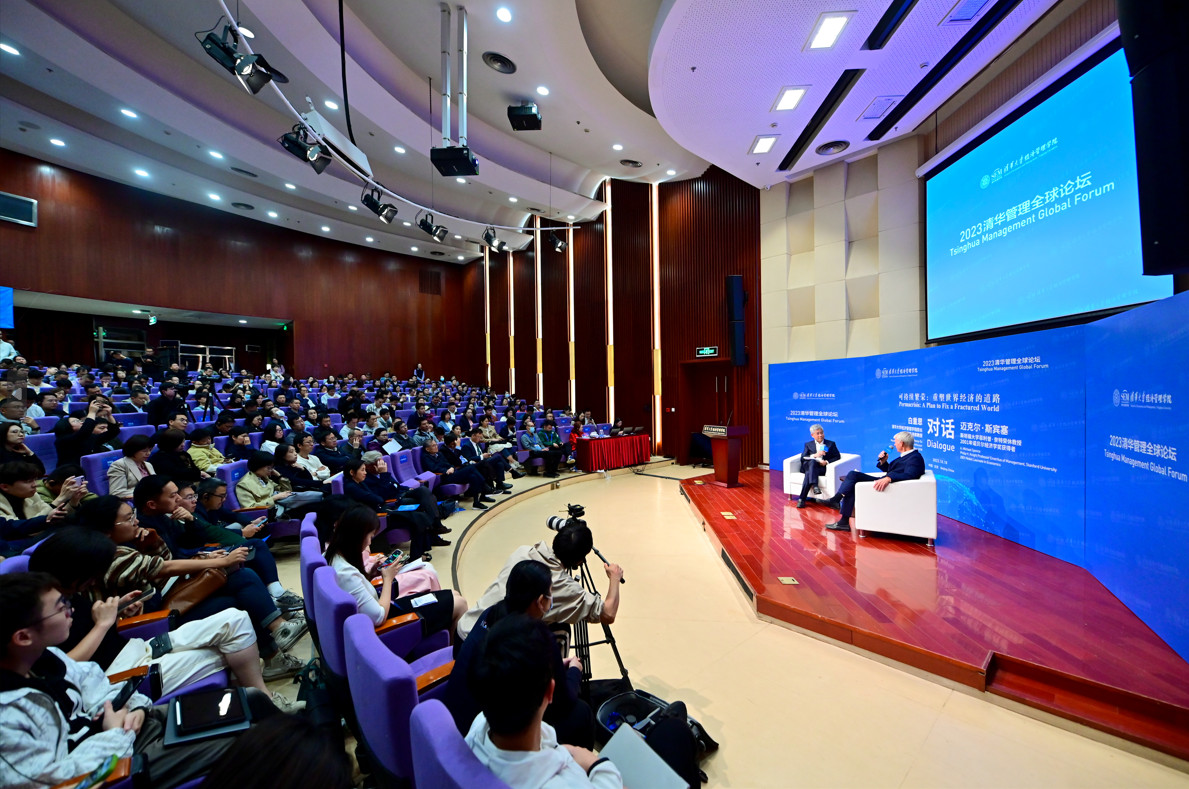
BAI and Spence discuss topics in the new book.
Towards the conclusion of the dialogue, Spence shared anecdotes from the writing process. Despite the four authors coming from vastly different professional backgrounds and holding divergent perspectives, they were united by a shared concern about the world their children would inherit. The collective aspiration to present an agenda for enhancing their future brought them together.
The audience displayed remarkable enthusiasm through the final segment. They posed questions to the two professors, asked about AI's impact on the market environment, the collaboration between China and Europe, the digital divide between younger and older generations, and the shifts in international trade dynamics.
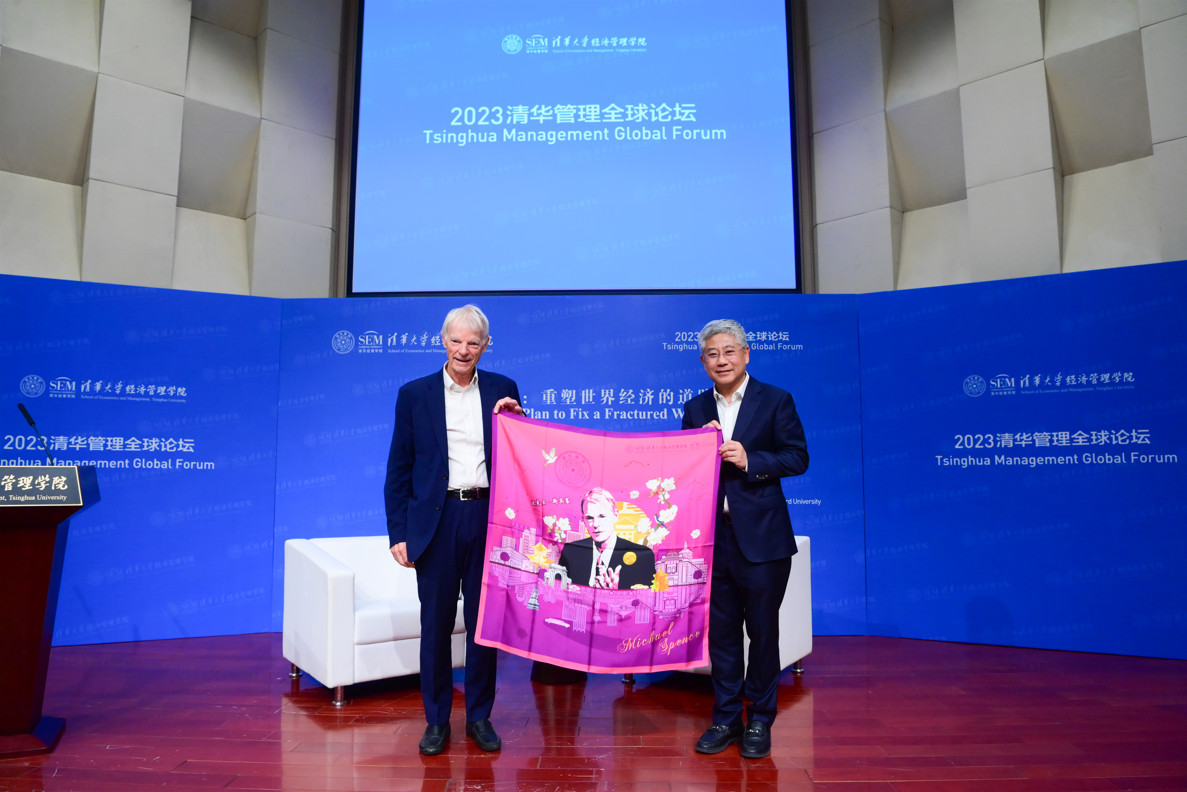
BAI Chong-EN presents a gift to A. Michael Spence.
The forum reached its conclusion amid a round of applause, with BAI presenting a silk scarf to Spencer as a special gift to symbolize Tsinghua's global connections.
Source: EMBA Education Center
 Latest News
Latest News